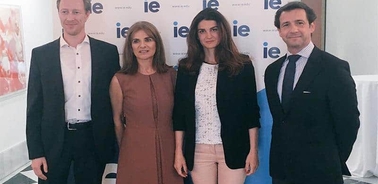- Home
- News And Events
- What’s Going On
- Personalization, Memorable Experiences And Gastronomy Top Priorities For The Premium Travel Industry
Personalization, memorable experiences and gastronomy top priorities for the premium travel industry

The greatest challenge facing the luxury travel industry is the personalization of services, according to the latest edition of the 2017 IE-Mastercard Premium Travel Barometer report, drawn up by the IE Business School and Mastercard Observatory on the Premium Market and Prestige Products.
Personalization of travel plans has climbed from the second position it held in last year’s report to the top position this year. Experts claim that this is because travelers find themselves faced with a large range of options, which means that personalization helps them in their search and results in optimum experiences for each individual.
The report is based on the opinions of experts on key aspects and trends within the premium travel sector this year. With a growing number of options for premium and luxury consumers, there is a growing need to adapt experiences to the individual needs of consumers. “We can see direct parallels between the Premium Tourism Barometer and the Premium and the Luxury Goods Barometer. The need to create memorable experiences and to personalize the product appear in the top three positions in both cases. Also, the levels of excellence that teams achieve plays a key role in innovation through new technologies,” says Maria Eugenia Girón, director of the IE Business School Observatory on the Premium Market and Prestige Products.
The 2017 edition of the IE-Mastercard Premium Travel Barometer has brought different results to that of 2016. In 2016, connectivity was the top-ranked challenge, while this year it was down in seventh position, which means that connectivity has improved greatly over the last year. It is still, however, a key issue, particularly where millennials are concerned, given that they seek to share their experiences in real time. The Barometer found that when contrasting certain aspects of local and international travel, Spain still had a great deal of room for improvement in terms of connectivity.
“When it comes to both the personalization of services and the design, management and transmission and promotion of premium experiences, there is a big debate in the sector about the use of new technologies, such as cognitive intelligence versus hi-touch for high-level personal contact between the traveler and experts,” says Jörn Gieschen, who heads the report. “It is essential to find the best combination of the two approaches for each segment/traveler, and for each step of the customer journey, and to adapt new technologies to the needs of luxury consumers, with particular emphasis on gaining prior knowledge of their tastes.”
The way the experience is designed remained in the No. 2 position in the 2017 edition of the IE Premium Travel Barometer, and is closely linked to personalization, which tops this ranking. The personalization of services is key for the design and marketing of experiences, particularly premium market experiences. Experts and companies dedicated to lifestyle management need very little notice in order to be able to personalize the experiences of premium travellers.
Eva Ruiz, director of marketing at Mastercard España y Portugal, says that the data revealed by this year’s Premium Travel Barometer shows the increasing need to personalize products and services. “Thanks to advances in technology we can do just that. Mastercard’s Priceless Cities innovates on a daily basis to come up with consumer products and services that are increasingly adapted to customers’ needs and preferences, in order to achieve a truly priceless experience.”
The gastronomy sector is now among the top three aspects in terms of priority, particularly for premium travelers, having climbed 5 positions since last year’s edition of the report. Innovation, the fusion of cuisines, or a closer focus on the themes of restaurants, the ambiance, and experiences beyond the meal itself have placed this in the no. 3 position in the Barometer.
But premium travelers are also aware that there has been a rapid increase in the variety of experiences available online, many of which can be found on platforms dedicated to global experiences, such as websites for specific interests, or particular destinations for specific experiences. Furthermore there is increasingly more marketing on social media. This type of marketing is proving to be particularly effective among millennial travelers, and is no. 8 in the ranking of challenges that need to be addressed. Social networks are very important not only before but also during the actual trip.
With regard to brand and style, small is big, or, more specifically, premium travelers see small as being beautiful and unique. This concept, which includes local authentic products and services, is increasingly important for premium travelers, particularly millennials given their high levels of use of social media, because less commercial approaches always look better online. This aspect has grown in terms of importance since last year’s barometer, and is now ranked 7th.
The top 10 priorities for the premium travel industry in 2017 are, in order of importance:
- Service personalization
- Experience design
- Food and wine experiences and gastronomy
- “Small is beautiful”
- Quality management
- Consumer segmentation
- Connectivity
- Marketing on social media
- Innovative management
- Recruitment and training of human resources